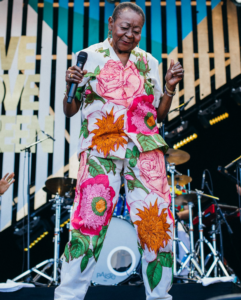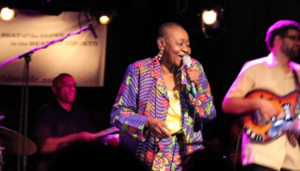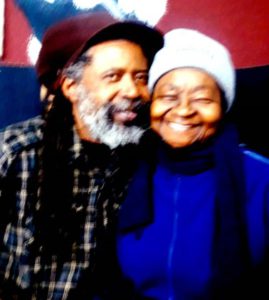By Ras Kefim
Photos: Ras Kefim\Facebook\YouTube\Wikimedia Commons
The following article, by New York-based author and businessman Ras Kefim, discusses the life and work of Trinidadian musical icon Calypso Rose. Ras Kefim is the author of the recently released book Deception In the Name Of the Lord. Read more about Deception In the Name Of the Lord in this Black Star News article.
Calypso Rose, the undisputed Queen of Calypso, was born Linda McCartha Monica Sandy-Lewis, on April 27, 1940, in Bethel Village, Tobago.

Rose, as she is affectionately called, is also known as the “Mother of Calypso.” Her reign as Calypso Queen is legendary, when looking at the number of awards and honors she has received through her lengthy career.
Calypso Rose’s creative skills started budding with writing songs at the age of 13. Over her lifetime career, spanning six decades, she has written more than 1000 songs and recorded more than 20 albums. This extraordinary feat earned her the titles, awards and honors that reward her for her contributions to culture and sociopolitical awareness.
In her early quest, a desire for the stage, Calypso Rose’s parents tried to discourage her interest in singing calypso. They failed. They thought the music was “evil,” and not appropriate for their daughter. Her father was a churchman.
Calypso Rose was not discouraged and they did not dissuade the young “Rose” from pursuing her passion which eventually bloomed.
Calypso Rose recalls that it was her aunt, Edith Robinson, who inspired her after she was sent to live with her and her uncle in Trinidad, at nine years old.. “My auntie – Miss Robbie – gave me all the love she had. I could sit in peace, suck my fingers and play with my pikkie [short, Afro textur ed] hair!”
“…she had all the calypso records,” says Rose. “She would grind up the gramophone and tell me: dance, dance, dance! On Sunday night she’d take me down to the clubs where they would be singing and moving until Monday morning, oh my God it was fantastic! I was on the roof! My auntie would be wearing her shorts and we were all just wiggling the bamsee [bottom] left-right, left-right.”
Calypso is a music genre evolving out of the slave plantation experience of West African slaves in the Caribbean. Sung by the slaves, it was first called “kaiso.”
Coming from a large family, Calypso Rose was the fourth child. Her mother, Dorchea Sandy, lost two of her thirteen children. Her father was, Aleto Sandy, a fisherman. Rose would go with him “every evening to the beach when she lived with him.” From this tradition, Rose said she has developed a tradition of drinking sea moss, and “eating a lot of fish, ginger, garlic, and banana” to give her the energy to put on a powerful show.

Her father, a preacher, was a leading member of the “Shouter Baptist Church,” sometimes called, “Spiritual Baptist,” a religion created by slaves out of their experience with plantation slavery in the former British West Indies colonies. It was from her mother that she got the name Macarthur. To Rose’s mother, there was something impressive about United States Army General, Douglas MacArthur, so she made the decision to link her daughter by this symbolic name association. But, more than likely, she had a vision of greatness for her daughter. And yes, symbolically, Calypso Rose has been a commanding general of the Calypso World ever since she took the reins in 1978. And she’s been ruling since then as, “Queen of the Road.”
I had the opportunity to meet Rose on a few occasions. The first time, was when I was in my business place and two women walked in and asked if I could make an outfit from the fabrics they had. I was, at the time, designing customized outfits, hats and jackets, for many people in the entertainment world.
After the introduction, I proceeded to take her measurements and then followed up with filling out a receipt. It was then, that I asked what name should I put on the receipt? She responded, Calypso Rose, with what I could only describe as nothing but a rosy smile.
I had other occasions working with Calypso Rose. But what amazed me every time we meet was: how charming, and humble, she seemed to be.
There is an element of culture that resonates through music in the Caribbean found primarily expressed in Calypso and Reggae, which traditionally carries an ear of protest against injustice. Lyrics, quite provocatively, laced with social and political commentary relating to food issues, gas prices, police-political corruption and the like are foundational. These traditional concerns are somewhat absent from the lyrical catalogue of both music genres today. But these are the elements, the socio-political concerns, that dominated the Caribbean musical landscape that gave rise to people like Harry Belafonte, Calypso Rose and Bob Marley, to name a few.

It was this element of social consciousness, in the evolution of Caribbean music, that brought Bob Marley and Calypso Rose on the same stage. Two giants in their own right, from different genres on the same stage many miles away from home. Jamaican and Trinidadian musicians have had cross island collaborations before. But this was extraordinary, a collaboration with the “Queen of Calypso” and the dubbed “King of Reggae,” both undisputed in their own style.
“1969 Calypso Rose was on an equal footing with Bob Marley. The Caribbean artists performed together at a New Year’s Eve concert held in the ballroom of the Grand Concourse in New York’s Bronx. The people went crazy,” Rose recalls.
“He was such a spiritual man,” she says. “He never lifted his guitar off the stage without putting his head onto the wall and praying. He loved to dance to my songs.” she says. “We learned a lot from each other… except the smoking. I did not learn that. When he was smoking he would try to reassure me saying: ‘No threaten, no threaten.’ He meant: don’t be afraid. And I am lucky that I have never been afraid. The men have always respected me a great lot.”
The collaboration between Calypso Rose and Bob Marley is of major significance within the context of the relationship between Jamaica and Trinidad, culturally. Jamaican Harry Belafonte’s, “Banana Song” (RCA, 1956), was from Belafonte’s breakthrough 1956 Calypso album–the first album, in the world, of any genre, to sell one million copies in a year.
This success on the part of Belafonte did not go down well with many Trinidadian calypso artists. The controversy that developed seems to have been triggered by jealousy since the question at the time was: how can a Jamaican become King of Calypso? Calypso is Trinidadian!
Belafonte, in response to the controversy arising from his crowning as “King of Calypso,” as a Jamaican, said he was confronted by some calypsonians from Trinidad. They said to him,“You call yourself the king of calypso and you never come here and you never go up into competition. You never do jump-up, you never go into the tent, you never do nothing and you thief the music and call yourself king.”
Lord Melody, an early pioneer of calypso music, described Harry Belafonte, this way after meeting him, “…I admired him” Lord Melody said. “I met him on the streets of New York…from that time we were totally married.” Melody continued, “A lot of comments they use to have on Belafonte here is that he thief the calypso and he can’t sing calypso and he spoiling the people calypso, but they never thought Belafonte doing calypso would bring greater revenue to the individual calypsonians.”
Some of the greatest most successful people we know today, or in history, suffered tragedy, survived near death experiences, and such, before becoming the hero, the champion, or shining superstar that we know today. Calypso Rose is no exception.
Tragedy struck Rose, when at 18 years old, she was attacked by three men who violently raped her.
From this tragic experience, Calypso Rose developed an aversion to men and never had any intimate relation with men since then.
Rose’s experience is typical of many women who suffered from violent encounters with men, in families, and in the public. When men complain, about women’s behavior, they need to take a look in the mirror. Men should examine and see, historically, how many women and girls suffered–and are still been terrorized, brutalized, even killed, because of our inherited tradition of patriarchal tyranny. These scars do not heal easily or fast.
Victims struggle for the rest of their lives with these physical and psychological injuries. From my conversions, with women over the years, I am convinced physical and mental abuse have contributed much to lesbianism.
Androphobia: the scientific name for fear of men. It comes from “andros,” the Greek word for man, and “phobia,” which means fear.
For Calypso Rose, the journey was not made any easier when, in 2005, her gay nephew – Michael Sandy,“succumbed to head injuries after being badly beaten and run over by a vehicle in a hate crime in Brooklyn.”

On YouTube, you can find a video titled Chutney Pride Exclusive Calypso Rose Coming Out Interview which shows Rose talking to a presenter in an LGBT nightclub in New York, in 2012. Rose looks directly into the camera and says: “I am gay and I’m a supporter of gays. I’ve been married to a woman for the past 17 years and I’m not ashamed or afraid to say it right now.” Rose is now considered an icon for the LGBT community in the Caribbean.
As the first woman to win the T & T Road March title in 1977, and with consistent Calypso titles in following years, the organizers were compelled to change the masculine gender title “King” and made it more gender inclusive. They changed the traditional name for the winner of the competition from Calypso King to Calypso Monarch. This is how Calypso Rose became the first Calypso Queen of the world. The “Lioness of the Jungle,” revolutionized calypso culture as an instrument of change.
The last time I saw Calypso Rose, she look a bit frail. And, I learned later, from a friend who assists her sometimes, that she was sick. She survived a couple heart attacks, cancer and other health issues over the years. Sometime around 2019, while I was working on a customer’s locs, my back was turned to the entrance when I heard someone saying, “hey!, hey!” I looked around and it was Calypso Rose, with that smile.
I invited her in to take a seat and we chatted for a moment. On the wall, of my store, was a large display of Marcus Garvey which triggered a very proud comment from her, as she look smilingly at the Garvey portrait. “I was given the Marcus Garvey Lifetime Achievement Award,” she said. I congratulated her on another great achievement.
She elaborated for a moment on what Marcus Garvey meant to her. I was impressed with her depth of knowledge about the Jamaican philosopher, “Father of the Pan-Africa Movement,” Marcus Mosiah Garvey. What really grabbed my attention while she spoke was her passion about Africa.
Calypso Rose preserved precious memories of sitting on the beach talking with her grandmother where she was told her “grandmother was originally from French Guinea and ended up in Tobago because she was kidnapped and sold.” After learning this, I could understand more clearly the source of her passion which was expressed graphically in a song called, “Back to Africa,” which was released on September 13, 2011. This song was dedicated to her great-grandmother.
Because I want to go, and the land too far
I want to go, I’m begging Jah
Over yonder, where there’s many many moons yonder
I want to go back to Africa …
The tireless work of Linda McCartha Monica Sandy-Lewis, better known as, Calypso Rose, will not be forgotten. Her accomplishments are now registered as foot prints in the documentation of human history.
In 1989, she was given “The Humanitarian Award by Sunshine Music Awards.” In 1991 she was awarded “Most Outstanding Woman in Trinidad and Tobago by the National Women’s Action Committee. And in 2014, she was honored by the University of the West Indies with an honorary Doctor of Letters degree. It is said there is no greater honor than the honor of your peers.
Before we parted, at the end of our conversation, the last time I saw Calypso Rose, I asked her if we could take a photograph together and she was more than willing to do so. The picture at the bottom of this page resulted from that moment in time.
If you should ever have the privilege to be in Rose’s presence you will realize that her survival, in spite of the tribulations and trials, is a direct result of her sense of humor and love for, “The Party.”
Her Majesty -Queen-Mother of Calypso made this declaration: “I am a party animal, always have been,”…‘I am here to tell women, don’t be afraid.’


Ras Kefim, the author of Deception In the Name Of the Lord, is a New York-based author and business entrepreneur who through his various businesses (including being a master tailor and hat-maker) has done work for many local luminaries, particularly within the entertainment\cultural space. Ras Kefim can be contacted via e-mail at kefmedialocs@gmail.com or by phone at 1-347 369 8280.




